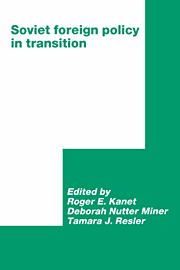Book contents
- Frontmatter
- Contents
- List of tables
- List of contributors
- Preface
- Introduction
- Part I The Soviet Union and the international political system
- Part II The Soviet Union and Europe
- Part III The Soviet Union and the developing world: global trends
- Part IV The Soviet Union and the developing world: regional and country case studies
- 8 Soviet policy in Central America during the Gorbachev period
- 9 The Soviet reassessment of socialist orientation and the African response
- 10 Soviet policy in the Middle East: Gorbachev's imprint
- 11 The implications of perestroika for the Third World, particularly Asia
- 12 The Soviet Union and Indochina
- 13 Gorbachev's Southeast Asia policy: new thinking for a new era?
- 14 The impact of Gorbachev's new thinking on Soviet policy toward South Korea
- Part V Conclusion
- Index
13 - Gorbachev's Southeast Asia policy: new thinking for a new era?
Published online by Cambridge University Press: 05 February 2012
- Frontmatter
- Contents
- List of tables
- List of contributors
- Preface
- Introduction
- Part I The Soviet Union and the international political system
- Part II The Soviet Union and Europe
- Part III The Soviet Union and the developing world: global trends
- Part IV The Soviet Union and the developing world: regional and country case studies
- 8 Soviet policy in Central America during the Gorbachev period
- 9 The Soviet reassessment of socialist orientation and the African response
- 10 Soviet policy in the Middle East: Gorbachev's imprint
- 11 The implications of perestroika for the Third World, particularly Asia
- 12 The Soviet Union and Indochina
- 13 Gorbachev's Southeast Asia policy: new thinking for a new era?
- 14 The impact of Gorbachev's new thinking on Soviet policy toward South Korea
- Part V Conclusion
- Index
Summary
The Soviet Union's role in Southeast Asia has gone through a metamorphosis. For most of the postwar period, it had only peripheral interests in the region. Indeed, the Southeast Asian countries viewed the Soviet Union largely as an outsider, a “white power” with no concerns or legitimate interests in Southeast Asia. But by the 1980s, after a shift in its policies, the Soviet Union had emerged as an important actor in Southeast Asia. This chapter traces the growth of the Soviet Union as a Southeast Asian power and compares Moscow's old and new thinking toward the region. The object is to show how the Soviet Union has become a major power in the region and to delineate the changing focus and policies of the Soviet Union, especially under Mikhail Gorbachev, toward Southeast Asia.
Soviet postwar policy toward Southeast Asia
For years the Soviet Union had no direct interests in Southeast Asia. Even after World War II, when tremendous political and social changes were taking place in Southeast Asia, Stalin continued to neglect the region. Moscow exhibited this neglectful, even hostile, posture toward the Southeast Asian countries in many ways: by its refusal to recognize states like Burma, Thailand, and Indonesia; by its failure to recognize the government of Ho Chi Minh until 1950; and by its continued call for revolutionary struggle in Southeast Asia, such as the endorsement of the communist uprisings in the region that broke out in 1948 in Malaya, Indonesia, Burma, the Philippines, and Thailand.
- Type
- Chapter
- Information
- Soviet Foreign Policy in Transition , pp. 256 - 274Publisher: Cambridge University PressPrint publication year: 1992



